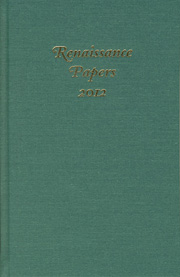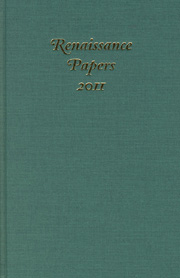26 results
Shakespeare, Revenge Tragedy and Early Modern Law: Vindictive Justice. Derek Dunne. Early Modern Literature in History. Basingstoke: Palgrave Macmillan, 2016. ix + 230 pp. $95.
-
- Journal:
- Renaissance Quarterly / Volume 70 / Issue 3 / Fall 2017
- Published online by Cambridge University Press:
- 20 November 2018, pp. 1226-1227
- Print publication:
- Fall 2017
-
- Article
- Export citation
Dedication
-
- Book:
- Renaissance Papers 2012
- Published by:
- Boydell & Brewer
- Published online:
- 05 December 2013
- Print publication:
- 01 November 2013, pp vii-viii
-
- Chapter
- Export citation
Cosmetic Blackness: East Indies Trade, Gender, and The Devil's Law-Case
-
- Book:
- Renaissance Papers 2012
- Published by:
- Boydell & Brewer
- Published online:
- 05 December 2013
- Print publication:
- 01 November 2013, pp 83-96
-
- Chapter
- Export citation
Frontmatter
-
- Book:
- Renaissance Papers 2012
- Published by:
- Boydell & Brewer
- Published online:
- 05 December 2013
- Print publication:
- 01 November 2013, pp i-iv
-
- Chapter
- Export citation
From One Marvell to Another: Puritan Logic in “To His Coy Mistress”
-
- Book:
- Renaissance Papers 2012
- Published by:
- Boydell & Brewer
- Published online:
- 05 December 2013
- Print publication:
- 01 November 2013, pp 97-104
-
- Chapter
- Export citation
“Bred Now of Your Mud”: Land, Generation, and Maternity in Antony and Cleopatra
-
- Book:
- Renaissance Papers 2012
- Published by:
- Boydell & Brewer
- Published online:
- 05 December 2013
- Print publication:
- 01 November 2013, pp 67-82
-
- Chapter
- Export citation
Ovid, Lucretius, and the Grounded Goddess in Shakespeare's Venus and Adonis
-
- Book:
- Renaissance Papers 2012
- Published by:
- Boydell & Brewer
- Published online:
- 05 December 2013
- Print publication:
- 01 November 2013, pp 13-20
-
- Chapter
- Export citation
Getting Past the Ellipsis: The Spirit and Urania in Paradise Lost
-
- Book:
- Renaissance Papers 2012
- Published by:
- Boydell & Brewer
- Published online:
- 05 December 2013
- Print publication:
- 01 November 2013, pp 117-125
-
- Chapter
- Export citation

Renaissance Papers 2012
-
- Published by:
- Boydell & Brewer
- Published online:
- 05 December 2013
- Print publication:
- 01 November 2013
Antipholus and the Exorcists: The Acts of the Apostles in Shakespeare's The Comedy of Errors
-
- Book:
- Renaissance Papers 2012
- Published by:
- Boydell & Brewer
- Published online:
- 05 December 2013
- Print publication:
- 01 November 2013, pp 31-40
-
- Chapter
- Export citation
“An Heap Is Form'd into an Alphabet”: Thomas Blount's Sociable Lexicography
-
- Book:
- Renaissance Papers 2012
- Published by:
- Boydell & Brewer
- Published online:
- 05 December 2013
- Print publication:
- 01 November 2013, pp 105-116
-
- Chapter
- Export citation
Reconstructing the Bower of Bliss: Homoerotic Myth-Making in The Faerie Queene
-
- Book:
- Renaissance Papers 2012
- Published by:
- Boydell & Brewer
- Published online:
- 05 December 2013
- Print publication:
- 01 November 2013, pp 1-12
-
- Chapter
- Export citation
The Summoning of Hamlet and Lear
-
- Book:
- Renaissance Papers 2012
- Published by:
- Boydell & Brewer
- Published online:
- 05 December 2013
- Print publication:
- 01 November 2013, pp 53-66
-
- Chapter
- Export citation
Contents
-
- Book:
- Renaissance Papers 2012
- Published by:
- Boydell & Brewer
- Published online:
- 05 December 2013
- Print publication:
- 01 November 2013, pp v-vi
-
- Chapter
- Export citation
The Soul as Commodity: Materialism in Doctor Faustus
-
- Book:
- Renaissance Papers 2012
- Published by:
- Boydell & Brewer
- Published online:
- 05 December 2013
- Print publication:
- 01 November 2013, pp 21-30
-
- Chapter
- Export citation
Paul's Cross Churchyard and Shakespeare's Verona Youth
-
- Book:
- Renaissance Papers 2012
- Published by:
- Boydell & Brewer
- Published online:
- 05 December 2013
- Print publication:
- 01 November 2013, pp 41-52
-
- Chapter
- Export citation
Chapter 6 - Tradition and Genre: Thomas Kyd's The Spanish Tragedy
-
-
- Book:
- Bakhtin and his Others
- Published by:
- Anthem Press
- Published online:
- 05 May 2013
- Print publication:
- 01 March 2013, pp 87-104
-
- Chapter
- Export citation
Frontmatter
-
- Book:
- Renaissance Papers 2011
- Published by:
- Boydell & Brewer
- Published online:
- 05 April 2013
- Print publication:
- 15 November 2012, pp i-iv
-
- Chapter
- Export citation

Renaissance Papers 2011
-
- Published by:
- Boydell & Brewer
- Published online:
- 05 April 2013
- Print publication:
- 15 November 2012
Contents
-
- Book:
- Renaissance Papers 2011
- Published by:
- Boydell & Brewer
- Published online:
- 05 April 2013
- Print publication:
- 15 November 2012, pp v-vi
-
- Chapter
- Export citation



